|
December 22, 2005
Presenting: Danielle Weiss - Latin America
Fan and Sustainable Travel Expert
I had a chance to meet Danielle through G.A.P
Adventures, Canada's largest adventure travel company. G.A.P
is sponsoring our first Travel Story Contest
with the fabulous top prize of an expedition cruise on the mighty
Amazon River and in working with them I have had a chance to meet
a few staff members of this unusual and highly successful ecologically
and socially conscious travel company.
Danielle is one of those individuals, who at a very young age,
could already have written a book. After growing up in Toronto and
attending university, Danielle spent several years living in Latin
America and also worked as a tour leader for G.A.P Adventures where
she got exposed to a variety of countries and regions in South America.
Along the way she fell in love with the people and cultures of
Latin America and made some key experiences that have shaped her
for a lifetime. Let's listen to Danielle's story and how her time
in Latin America has truly changed her life.
1. Please tell us a bit about yourself, where are you from,
what is your background?
I was born and raised in the suburbs of Toronto by my mother. For
the first ten years of my life my mom and I travelled to Europe
on a regular basis to visit our relatives and when I was a bit older,
we began to take holidays to warmer climates in Mexico and the Caribbean.
Despite the fact our trips south were mainly resort vacations, these
trips opened my eyes at young age to a world that extended outside
of southern Ontario suburbia. When I was 19 I travelled for the
first time on my own to British Colombia. I met travellers from
around the world as I hiked and backpacked and I am sure it was
this trip in particular that instilled the travel bug in me.
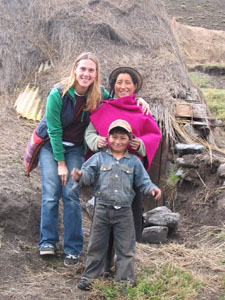
Danielle, working in an indigenous village in the Ecuadorian Andes
2. What other places have you travelled to?
After my first solo travel experience in BC, I decided to travel
to the Middle East when I was twenty. I walked into a Kibbutz office
in Toronto and within one week of deciding and absolutely no idea
what I was getting myself into, I found myself on a plane to Israel.
I spent a month volunteering on a kibbutz and then another month
travelling through Israel and into Egypt. Despite a bumpy beginning,
it ended up being an incredibly empowering experience knowing that
I could travel as a single woman through the Middle East on my own.
After that the majority of my travelling has been within Latin
America with a few visits to places in other parts of the world.
My travels over the past few years have taken me to Ecuador, Peru,
Bolivia, Argentina, Brazil, Uruguay, Venezuela, Guatemala, Costa
Rica, Malaysia, Borneo, Spain and Antarctica.
3. During university you travelled to Guatemala and Costa
Rica. What were these first trips to Latin America like.
The year after Israel I booked my next trip to Costa Rica with a
friend from University. We spent a month backpacking around the
country on local buses and staying in hostals. It was low season
so we ran into very few travellers along the way. We spent most
of the time in the northern province of Guanacaste where we befriended
a group of locals. We ended up spending almost our entire vacation
with a retired cattle rancher, a doctor, a hotel owner and a well-known
Costa Rican singer…Frank Sinatra style. Unlike my other trips,
where I spent the majority of my time with other travellers, this
was the first time that I got to know the locals who introduced
me to the real Costa Rica.
Less than a year later I found myself in Guatemala for two months
where I enrolled in one-on-one Spanish Language classes. I spent
hours talking with my Spanish teacher who told me about the tortured
history of her country including stories of her friends and family
that had disappeared. She made me realize how lucky I was to have
grown up in Canada and I learned that you can never really know
a place unless you take the time to meet the local people and listen
to the stories of their reality.
4. A key experience for you was your trip to Ecuador in
your third year of university during which you studied at a local
university and did some volunteer work. This time changed your life.
Please tell us about that trip.
After leaving Guatemala my Spanish had improved immensely and I
was ready for the adventure of a lifetime. I was in my third year
of University and I had been accepted to a study abroad program
in Ecuador. Little did I know that one year in Ecuador would change
me and my life forever. I spent the first semester living with a
family in a small town located about half an hour from the capital
city of Quito. Even today eight years later I am still in touch
with them on a regular basis and know that we will be friends forever.
I studied at the university and took courses on Latin American culture,
history, politics, economy but what I remember the most were my
experiences outside of the classroom. That was the year I learned
to speak Spanish, I made life long friends, I travelled all over
the country and met new and interesting people from all over the
world. At times I felt helpless when I saw the reality of people
living in poverty wishing that there was something I could do. But
at the same time I found that the people who appeared to have the
least were the ones that gave me the most. It was then that I decided
that I wanted to dedicate my life to working with poor communities
in Latin America.
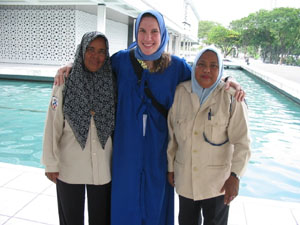
Entering a mosque in Malaysia
During my second semester I lived on a reserve with local and international
volunteers in the coastal jungle. We spent four months doing community
outreach to surrounding communities. It was the year of El Nino
so we would walk for days along paths through the jungle at times
with mud up to our thighs, through torrential downpours and wading
through rivers to get to these remote communities. The people in
these communities were always so welcoming. We planted fruit trees
around the schools so the children would have fruit to eat, we taught
environmental education, and started a women’s coop teaching
them how to weave hats out of banana leaves to sell. Because the
international volunteers would come and go, my closest friends were
the Ecuadorians who worked there. During that entire year I knew
that there was nowhere else in the world that I would rather be.
5. What was it like coming back to Toronto after this trip?
What did you do when you got back in town.
Saying goodbye to my friends in Ecuador was heartbreaking. They
asked me if I’d be coming back, but I said no because I still
wanted to go to Asia and see more of Africa. I flew home for a week
saw my mother and my friends, quickly realizing that it was impossible
for me to describe a full year of life changing events and experiences
into a five minute synopsis. I felt like a completely new person.
After a week of catching up with friends and family I was back
on a plane out west for a season of tree planting which I have to
admit is one of the hardest jobs out there. I loved being in the
outdoors, I loved working hard, I loved camping and I loved the
lifestyle, but my heart and mind were still in Ecuador so I found
it very difficult to adjust to the new people and situation. I decided
I needed a break and time to digest what I had just been through
before throwing myself into a completely new world. I ended my contract
early, and flew back home.
Unfortunately coming back to Toronto was like being forced to snap
back into a reality that I didn’t want to be a part of. Of
course I had missed my mother and my friends, but I was going through
some serious reverse culture shock. At the time I knew nothing about
reverse culture shock, but it wasn’t until months later that
I read a chapter in a book about it. I was so relieved when I realized
that what I was going though was normal and that everything would
be okay. They say it takes about as long for you to adjust as the
amount of time you have been away and it was true.
6. Why does Latin America hold such a fascination for you?
I have no idea why Latin America holds such a fascination for me.
I am convinced that I have spent past lifetimes there because when
I am there I feel more at home than I do anywhere else. I love the
people, the culture, the mountains, the jungle, the coast, the food,
the music and the language. Individuals, families and communities
have welcomed me into their hearts and homes and when I am there
I really feel as though I am living each day.
7. You decided that you needed to go back to Latin America,
where did you go and why?
In my last month of university I came to the realization that I
wasn’t going to be happy unless I returned to Ecuador. After
numerous computer searches I came across a short 150 word posting
looking for an intern to help out with a research project in the
Andes of Ecuador. I worked harder on that application than I did
on my final thesis and within a week of handing in my thesis I was
back on a plane to my beloved Ecuador.
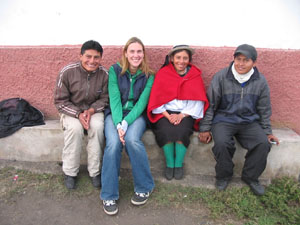
Danielle in Ecuador with Maria, the first indigenous woman to summit
Mt. Chimborazo
8. You have participated in volunteer projects in Ecuador.
Please tell us about hose.
When I returned to Ecuador for the second time I spent the first
two months living with the Ecuadorian family I had grown to love
during my university experience and spent my days improving my Spanish
by studying at a language school in Quito.
I then spent the next six months doing an internship in the Ecuadorian
highlands. I worked alongside two Americans and an Ecuadorian living
in a mountain refuge studying one of the last remaining high altitude
forests. We spent weeks at a time camping out in the forest, doing
transect lines and scientific studies. We travelled to mountain
communities where we worked with the local school children and planted
native trees around the school.
With a grant from Yale University we tried to buy the land but
unfortunately the local landowner wouldn’t budge. So after
months of trying to convince the landowner we finally gave up and
instead we decided to purchase a piece of land in front of the mountain
refuge and create a high altitude organic farm. We developed the
Nucanchi Yuracuna Foundation and I became the Director of the organic
farm. The other volunteers returned home and I was left to work
alongside a group of Ecuadorian farmers. We plowed and tilled the
land and planted habas and quinoa. I bought books in Quito and studied
organic agriculture and we planted native trees around the border
of the land. We had plans to build a greenhouse and use it as a
model for farmers in Ecuador. Unfortunately the funding ran out
and I found myself ready for a change and a new adventure.
9. There was a time when you had very little money. You
literally survived on a dollar a day. What happened and how did
you handle the experience?
My next move took me to Riobamba, a town located just half an hour
from the farm. I became an English teacher at an English language
institute in town. I taught there for five months before returning
home for one month at Christmas.
After spending a month at home I returned to Ecuador. Within a
few hours of returning I was robbed and I lost everything! I didn’t
even have three dollars for the bus ride back to Riobamba. I was
only teaching one hour a day at the language school earning 15,000
sucres which at the time was the equivalent of one dollar per day.
I had enough money for one meal a day and spent most of my time
hungry. I knew that I could have called home for help but I wanted
to see if I could survive on my own.
Luckily I lived with a wonderful Ecuadorian family who didn’t
mind waiting for my rent money. I posted signs up all over town
in restaurants and internet cafes advertising my service as an English
tutor. Little by little I had students lined up and taught classes
in their homes. In hindsight I know it was a good experience for
me because I truly understood what it was like to live on almost
nothing, I realized could overcome all obstacles, I learned to count
my blessings and it definitely made me appreciate all the wonderful
people in my life.
10. While you were in Latin America, you connected with
the adventure travel business. How did that come about?
The day before I returned to Canada for Christmas, I was having
breakfast at one of my favourite restaurants in Quito when I saw
a poster advertising for a job to work for G.A.P Adventures, the
Great Adventure People. The poster said, “Do you love Latin
America? Do you love to Travel? Are you a Great Adventure Person?”
I knew right away that it was the perfect job for me. While in Toronto
I dropped off my resume at G.A.P’s head office before returning
to Ecuador.
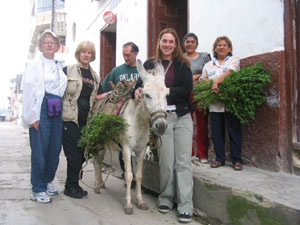
Leading a GAP group in northern Peru
After a month I received an email from G.A.P asking that I go to
Quito for an interview with the Quito manager. Shortly after I received
a call in Riobamba that I had the job. I had four days to quit my
teaching and tutoring jobs, sell my car, breakup with my boyfriend
and move out of my apartment. The next thing I knew I was on a 36-day
training trip with G.A.P Adventures travelling through Ecuador,
Peru and Bolivia. Initially the best thing about the job was that
I was given a $15 day budget for food after eating for less than
a dollar a day, I was over the moon.
11. You spent about a year on the road as an adventure
tour leader. What places did you see? What activities did you do?
What was it like to be on the road so much?
I spent just over a year leading tours for G.A.P
Adventures which was an incredible experience. After having
spent several years in Ecuador I remember the day I first crossed
the boarder into Peru. I was travelling with an experienced G.A.P
tour leader and her group of travellers. I think I was more excited
that day than anyone else in the group. I had never really thought
about exploring more of South America. I had travelled all over
Ecuador, to the Amazon, all along the coast, into the mountains,
to the touristy areas, and to places that had never before been
visited by foreigners. I knew Ecuador better than most Ecuadorians
but I felt that I still had so much to explore and discover within
Ecuador itself, which is why venturing out to another country had
not really crossed my mind.
I was excited to finally see more of South America and I felt as
though I was starting a new chapter in my life. Just like Ecuador,
I also fell in love with Peru, Bolivia and Brazil. Each country
is unique and special in its own way.
As a tour leader I wanted to show each person in my groups what
made Latin America so special for me and I wanted them to come away
from their trip sharing a love for Latin America. I always made
sure to include places that most tourists didn’t have the
opportunity to visit. Sometimes I would take them to local restaurants
in the non-touristy part of town so that they could try the local
Peruvian delicacy, Guinea pig. Other times I would take them to
visit my local family in Riobamba and we would spend the night learning
how to play Ecuadorian drinking games with cards, and once I got
my group to help make hot chocolate and bake bread which was delivered
to children outside of Cuzco at Christmas. Other activities that
made the job great were hiking the Inca Trail, white water rafting
in the Amazon, mountain biking down winding mountain roads and visiting
community-based ecotourism projects.
Like any job, there are pluses and minuses. I loved being a tour
leader and was happy to deal with any and every obstacle that I
encountered, like transportation strikes, mudslides, political unrest,
poor group dynamics, sick travellers etc. Every day was an adventure
and I really felt as though I was living each day to the fullest.
But the truth is that for me, living out of a backpack, staying
in hotels and eating in restaurants took its toll. G.A.P has some
tour leaders that have lead for over five years and to this day
I am in complete awe of them. After finishing my contract I felt
that I was ready to take a break. I looked forward to staying in
one spot for awhile, to sleep in the same bed for more than a night
at a time, to cooking my own meals and to spending time with friends.
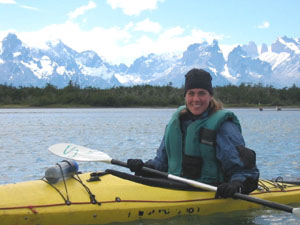
Kayaking in Patagonia, Chile
12. What learning experiences have you gained from your
travels?
Travelling has opened my eyes, my heart and my mind to new cultures,
people from all over the world and to the natural beauty of each
country that I have visited. Despite having gone to university for
five years, I feel that my biggest education has come from life
and from travelling. For me it has always been about the people
I have met along the way. It’s amazing to me how you can know
someone for a month, a week, a day or an hour and you can feel like
you’ve known that person your entire life. I’ve learned
that we can learn something from everyone. When I travel I feel
alive and I feel open to the world and to every experience that
comes my way.
I have also leaned to appreciate how fortunate we are here in Canada.
What made me realize how lucky we are were certain incidents such
as watching helplessly as a man sliced off his finger with a machete,
watching a woman writhe in pain in a village that was an eight hour
walk from the nearest health clinic and having a four week old baby
die in my arms. These and other experiences really made me appreciate
how lucky we are to have access to free healthcare, safe drinking
water, education, jobs etc. They are basic rights and I want to
spend the rest of my life working to help people gain access to
these things.
Travelling has also taught me that I am at my happiest when I live
each day to the fullest and to appreciate everything and everyone
in my life. I believe that we are all on a spiritual journey and
that everything that happens to us, especially that bad things are
because there is something we need to learn from them. The biggest
learning experience is life and the best thing we can do is to live
it.
13. After about 36 months in Latin America you somehow
ended up back in Toronto. How did that happen and what does it feel
like?
After finishing my tour leading contract with G.A.P, I spent the
next six months back in Quito volunteering for an non-governmental
organization, called Accion Ecologica. They were fighting the construction
of a new oil pipline that was cutting through several natural reserves
and indigenous territory. After six months of volunteering with
them I realized that it was about time I figured out what I was
going to do with my life next. After much though I finally accepted
a position in the head office.
The first three months were very difficult as I felt that I had
just left a lifetime of memories and friends behind me but this
time I knew what to expect as I had already reintegrated once before.
It wasn’t easy, but it has now been four years since I returned
to Canada which is about the same time I was away and I am very
happy to be where I am. I still get itchy feet every once in a while,
but Toronto is a great city, I love my job and the people I work
with.
14. You have become an expert in Sustainable Tourism. What
does that mean and what do you do?
I currently work for G.A.P
Adventures as the Sustainable Tourism Coordinator. I have seen
the positive and negative effects of tourism and I believe that
everyone who travels must be conscious of the affects they may be
having on the environment, people and the cultures in which they
are travelling.
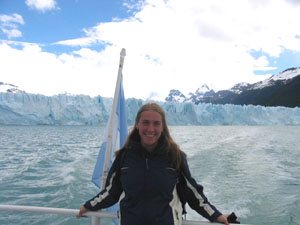
Visiting Perito Moreno glacier, Argentina
It is my job to ensure that we operate responsibly at all levels
of the company. In the head office we have implemented eco-friendly
initiatives. On the ground we travel in small groups (max 12 on
the majority of our tours) we stay in small-scale hotels, travel
using local transportation and incorporate community-based ectourism
where possible. It is also my responsibility to develop and manage
G.A.P’s non-profit organization, the Planeterra Foundation.
Through this foundation we support local community projects and
international charities that work in the areas we operate.
15. What are you 3 favourite / most interesting / most
significant travel memories of all time?
It is really difficult for me to narrow down three of my favourite/most
interesting travel memories of all time. I’ve had so many
eye opening, life changing, entertaining and interesting experiences
that I really wouldn’t even know where to start. In Latin
America, I have felt at times that I have lived an entire lifetime
in just a few days. So when you multiply that by several years,
I’ve got enough memories and stories to fill a book. For that
reason I have decided to start writing down my stories and am hoping
to get them published one day.
16. What are you plans in the next while, travel and otherwise?
My plans for now are to continue working for G.A.P Adventures in
Toronto and to continue developing the Planeterra Foundation. Eventually
I would love to live in Latin America and work directly with the
communities we support. As for traveling, there are still many places
I’d like to explore in Latin America. Other places I would
like to travel to include India, Nepal, Tibet, Laos, Cambodia and
West Africa.
Thank you, Danielle, for sharing your inspiring story and I hope
you'll keep us up-to-date on all the exciting things that lie ahead
for you.
G.A.P Adventures
is Canada's largest adventure travel company and a leader in socially
and environmentally sensitive travel. G.A.P is also the sponsor
of the grand prize for our first story contest: an exciting adventure
cruise on the Amazon on the historic and unique Explorer expedition
cruise ship. Visit our contest page to find out more about our
first travel story contest.
Related Articles:
An interview preview and
further information on Danielle Weiss
Danielle Weiss talks about sustainable
travel
Bruce Poon Tip: A global travel entrepreneur
with a conscience
Kevin Lee and the Scadding Court Community
Centre send at risk children on life-changing international learning
experiences to China, Mongolia and India
Richard Belliveau climbs mountains
to raise money for street kids in Peru
|